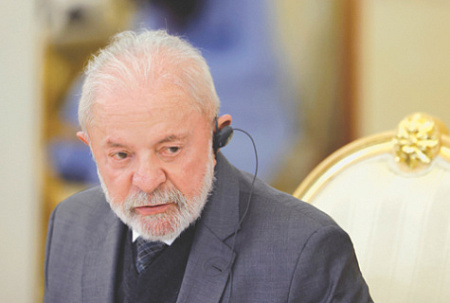
Brazilian President Luiz Inacio Lula da Silva has arrived in Beijing. By welcoming him, as well as other high-ranking officials from Latin American countries, Chinese President Xi Jinping wants to demonstrate China’s intention to have a reliable foothold in the region. Many leaders in South America approve of this plan, considering China an important economic partner. And some of them see China as a counterweight to Washington’s dominance. Moreover, US President Donald Trump is pursuing a policy in the spirit of the Monroe doctrine, proclaimed at the beginning of the 19th century. Its meaning is that the Western hemisphere should be the sphere of influence of the United States, not some other country.
Not the new Monroe doctrine at all, but independence and self-determination! This is what the countries of Latin America and the Caribbean are striving for, Chinese Assistant Foreign Minister Miao Deyu said at a press conference. He was referring to the doctrine promulgated by U.S. President James Monroe in 1823. Monroe warned European countries not to interfere in the affairs of the Americas.
It would seem that what was said in the days following the Napoleonic wars has long since sunk into oblivion. However, according to The New York Times, the current US Secretary of State, Marco Rubio, makes statements in the spirit of the Monroe doctrine. According to Rubio, the administration of President Donald Trump follows the principle of “North and South America first” in its foreign policy. Therefore, Rubio’s first trips abroad as Secretary of State were voyages to Panama, Guatemala and other countries in the region. But Rubio was not welcomed with open arms. The tariffs imposed by Trump, and especially his threat to occupy the Panama Canal, have thrown many Latin American leaders off balance. Those politicians who looked at the United States with hostility were most alarmed.
“Lula considers China not just a trading partner of Brazil, but a geopolitical counterweight to the dominance of the United States. Lula wants to reduce Brazil’s dependence on Washington, seeks to turn Brazil into a powerful athlete capable of moving heavy figures on the international stage,” says Professor Mathias Spector, a prominent Brazilian political scientist. It is no coincidence that Brazil, together with China, has taken the initiative to end hostilities in Ukraine.
Moreover, Lula is the most famous of the Latin American leaders who will gather in Beijing on Tuesday. Senior officials and ministers from the Community of Latin American and Caribbean Countries (CELAC), which does not include the United States and Canada, will be present there. Both the host and the guests will not only compliment each other behind closed doors. According to Chinese press reports, Colombian President Gustavo Petro, a leftist and former rebel, will be present at the meetings. As for the other participants, they used to be represented more often by foreign ministers.
China’s relations with Latin American countries are based on solid economic foundations. Over the past two decades, China has become a major importer of minerals in Brazil, Peru, Chile and other South American countries. The flip side of the coin was that the markets in Latin America began to be replenished with Chinese cars, various tools and equipment. China invests money in the construction of roads, ports, dams.
Brazil and other major exporters of raw materials hope that they will be able to repeat what happened during Trump’s first presidential term. Then, faced with US tariffs, China bought more soybeans, iron ore and other similar products from Latin America. According to Chinese customs, the trade turnover between China and Latin America amounted to 510 billion dollars, having almost doubled over the past decade.
However, according to Ryan Berg, an American expert on Latin America, Lula, despite his friendship with China, raised duties on imports of steel products and fiber-optic cable. And they come mainly from China. According to Berg, Latin American countries are very afraid that China, which Trump is blocking access to the US market, will flood their markets with cheap goods. This will ruin local industrial enterprises. Latin American countries have followed a policy of protectionism before, and now they will take additional steps to protect their entrepreneurs from Chinese dumping.
Mexico, Latin America’s second largest economy, is even more cautious in courting China than Brazil. Mexico is maneuvering, seeking to enlist the support of both China and the United States. Nevertheless, Chinese President Xi Jinping assures his Latin American partners that the problems will be overcome. China will purchase more and more raw materials and manufactured goods in the region.
